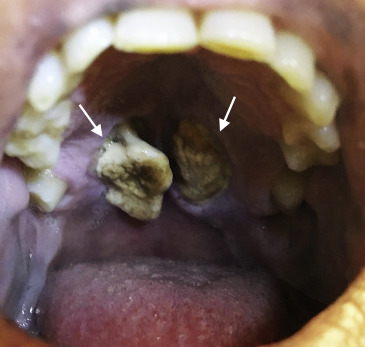A 50-year-old healthy man presented to the emergency department with painless palatal lesions that developed 3 weeks before, after a dental procedure ( Figure ). The lesions were initially tender, have since become painless, but remain extremely irritating.

Diagnosis
Necrotizing sialometaplasia . Necrotizing sialometaplasia is a benign inflammatory condition of the salivary glands. It can affect all salivary gland tissue but is typically observed in minor salivary glands of the posterior palate. The pathogenesis is unclear, but is believed to be due to vascular ischemia. Necrotizing sialometaplasia commonly occurs spontaneously, but predisposing factors include direct trauma, intraoral procedures, and alcohol and tobacco use.
Necrotizing sialometaplasia is rare and accounts for less than 1% of oral biopsied lesions. There is no racial predilection, but it is twice as common in men. The mean affected age is 50 years in men and 36 in women, with a range of 18 months to 80 years.
Initially, lesions can be painful or painless, with erythematous areas of induration or fluctuance, progressing to irregularly shaped ulcerations with well-defined borders and covered by necrotic debris. Because the differential diagnosis includes neoplasm, infection, and inflammatory and vascular conditions, emergency physicians should consider referring patients on a nonemergency basis for a definitive diagnosis by biopsy. Because necrotizing sialometaplasia is self-limiting and requires no specific treatment, patients should be offered symptomatic care. Lesions generally heal spontaneously in 2 to 3 months. Periodic evaluation is advised until resolution.
For the diagnosis and teaching points, see page e60.
To view the entire collection of Images in Emergency Medicine, visit www.annemergmed.com .
Stay updated, free articles. Join our Telegram channel

Full access? Get Clinical Tree






